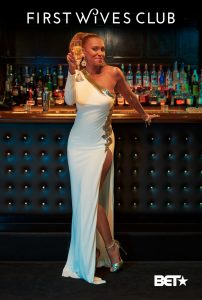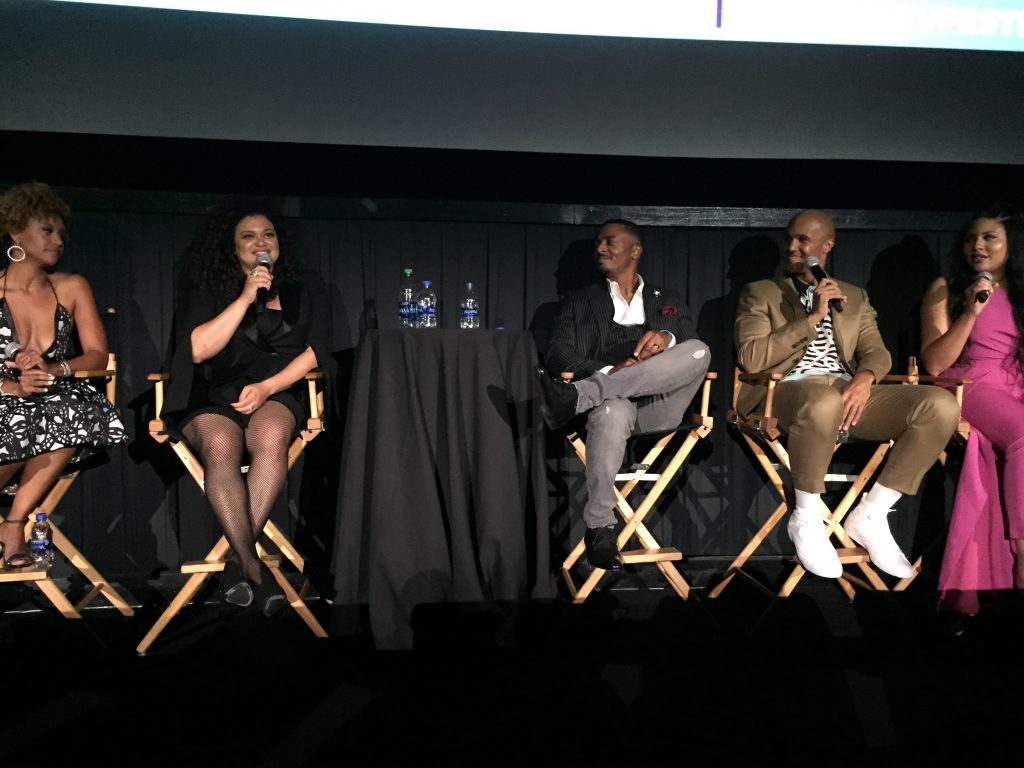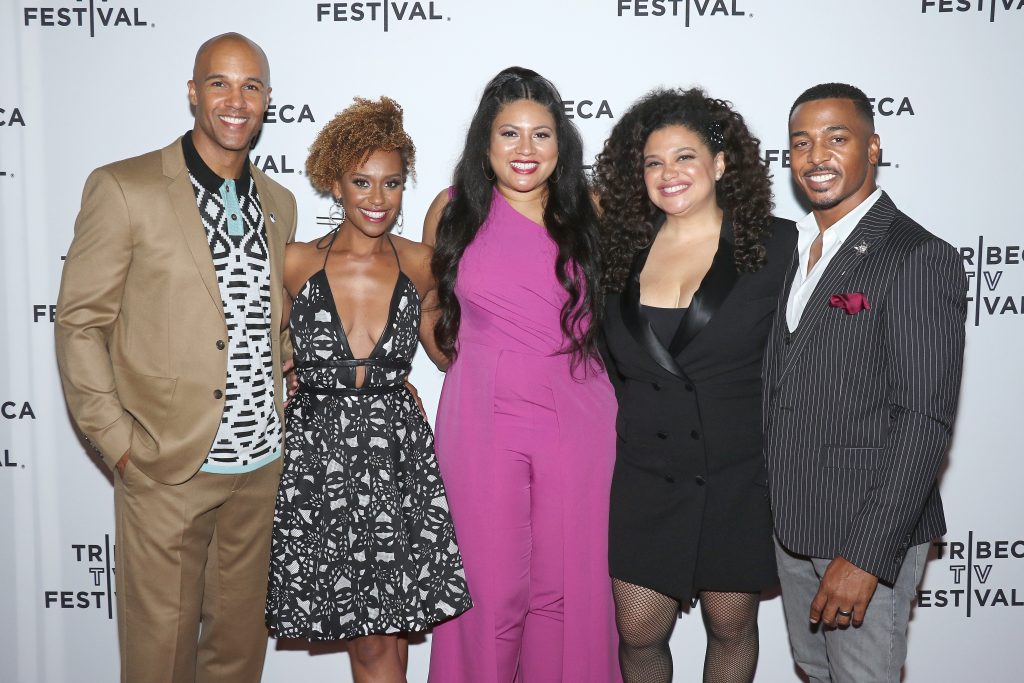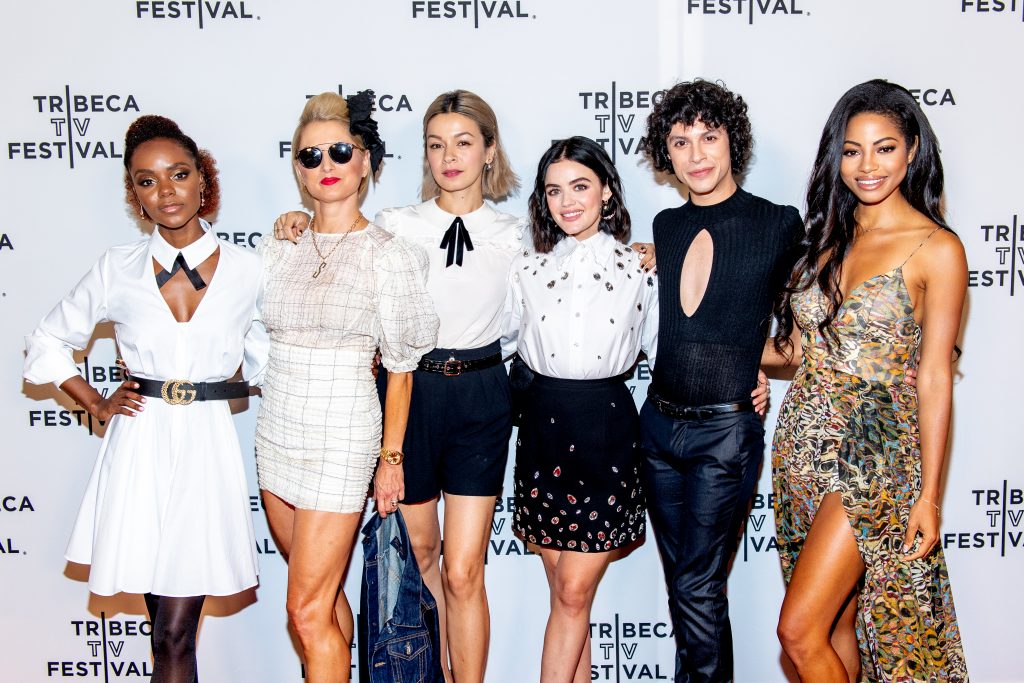May 12, 2021
by Carla Hay
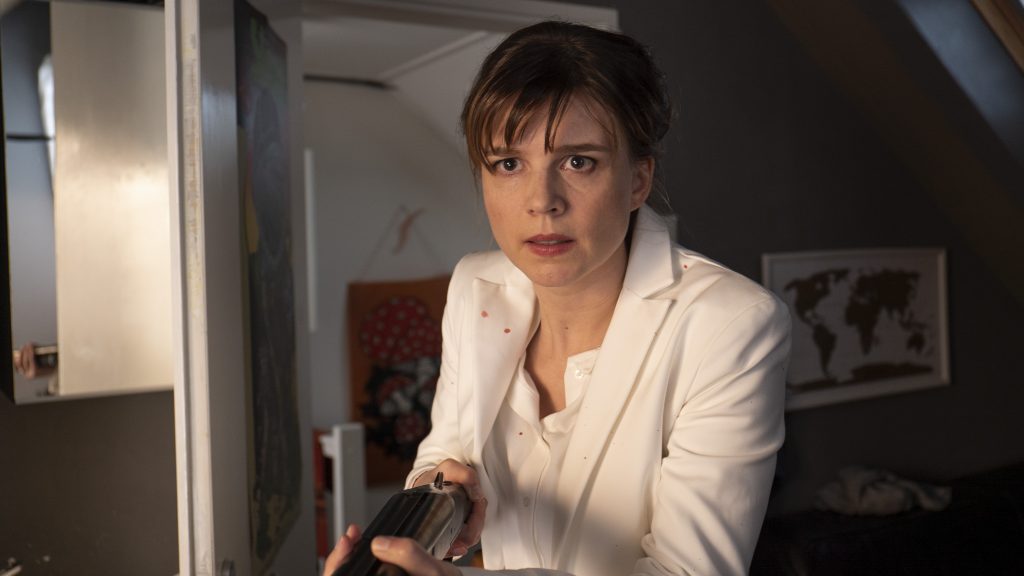
Directed by Ivo van Aart
Dutch with subtitles
Culture Representation: Taking place in Amsterdam, the satirical horror film “The Columnist” features a predominantly white cast (with a few biracial/black people) representing the middle-class.
Culture Clash: A seemingly mild-mannered newspaper columnist becomes a serial killer when she starts murdering her online harassers.
Culture Audience: “The Columnist” will appeal primarily to people who are interested in watching revenge stories with a dark comedic tone.

Make no mistake: “The Columnist” is not a truly feminist film. It’s a male exaggerated fantasy of a woman getting revenge on her male harassers by killing them. These two types of movies should not be confused with each other. The operative word in “The Columnist” is “fantasy,” because what happens in the movie is such hyper-surrealism that it can’t be taken completely seriously. And that seems to be the point, because “The Columnist,” for all of its flaws, is ultimately an incisive, satirical look at how revenge can be hollow if a bullied person becomes worse than the bullies.
“The Columnist” is a Dutch film that takes place in Amsterdam, but the story could be set anywhere in modern society. The movie was directed by Ivo van Aart and written by Daan Windhorst (two men), and this “male gaze” perspective is present during every single second of “The Columnist,” even though the main character in “The Columnist” is a woman. There’s absolutely no nuance or subtlely to this violent story, but at least it doesn’t become insufferable by having the female character spout cliché-ridden, pseudo feminist lines in an attempt to pass “The Columnist” off as a pro-female film. “The Columnist” is really just an artsy slasher flick, but it’s not quite a terrifying horror film because there’s really nothing too scary about it.
“The Columnist” might get some comparisons to the Oscar-winning “Promising Young Woman,” another female revenge movie that mixes drama and satirical comedy that is far superior to “The Columnist.” “Promising Young Woman” was written and directed by a woman (Emereld Fennell) and has a more authentic, less cartoonish depiction of an intelligent woman out for revenge in a society that enables toxic masculinity. In “Promising Young Woman,” writer/director Fennell kept the movie grounded in reality, although some viewers had a problem with the movie’s surprise ending.
However, the female protagonist in “Promising Young Woman” did something that the female protagonist in “The Columnist” does not do: She gave her victims a chance to redeem themselves by letting them live and possibly learn from their mistakes. Instead of killing her victims, the female protagonist in “Promising Young Woman” shrewdly (and often at risk to her own safety) made her targets take a very uncomfortable look at how their actions are part of rape culture. By contrast, the female protagonist in “The Columnist” just yells at and berates her victims before she murders them.
Whenever male writers and directors do a movie about a woman out for murderous revenge, they often make the mistake of depicting only men as the villains in the movie, in order to “justify” this woman going on a killing spree. One of the reasons why “Promising Young Woman” resonated with so many people is that it didn’t use this extreme and unrealistic trope. The protagonist in “Promising Young Woman” has a very loving and supporting father, and the movie authentically shows that women can be just as cruel as men when it comes to perpetuating misogyny.
“The Columnist” starts off with a somewhat predictable “battle of the sexes” scenario. Newspaper columnist Femke Boot (played by Katja Herbers) and horror novelist Steven Dood (played by Bram van der Kelen) are on a TV talk show, debating how online bullies (also known as “trolls”) should be handled by society. (By the way, “dood” means “death” in Dutch.) Real-life Dutch journalist Matthijs van Nieuwkerk plays a version of himself, as the talk show host. Femke has been the target of vicious online bullying by men, and this harassment is brought up in the discussion.
Femke says she doesn’t believe that Internet companies should bear all of the responsibility of punishing online bullies. She explains, “Our culture has to change. These days, we think it’s so normal that someone else, the person we don’t agree with, that they are our enemy.” Femke advocates for open exchange of different ideas, as long as people can disagree in a polite and civil manner.
Steven—who looks like a semi-Goth with heavy eyeliner and fingernails painted black—scoffs at Femke’s idealistic wishes. His response is, “This is just an old-fashioned campaign for decency.” The movie never explains why Steven was selected to be Femke’s adversary on the show. Is he a toxic person who doesn’t have a problem with online bullying? Or is he someone who thinks that governments and corporate entities shouldn’t interfere with freedom of speech? Or is it both?
Viewers don’t really find out why Steven is in direct opposition to Femke in this talk show discussion, because this TV debate scene ends very quickly, after just a few minutes. Femke is then seen riding her bike home from the TV station while it’s dark and pouring rain outside. She’s dressed in a way that she could easily catch a cold from this bad weather.
The movie never explains why Femke would choose to ride her bike in this torrential rain when she could presumably afford to call for a rideshare van to give her a ride home with her bike stowed in the back. When she comes home, she’s in a gloomy and seemingly empty house. The only conclusion that viewers can make from this scene is that the filmmakers want to make Femke look pitiful and to garner sympathy for her.
Femke, who is divorced, actually doesn’t live alone. She’s the mother of a strong-willed daughter named Anna (played by Claire Porro), who’s about 16 or 17 years old. Femke’s ex-husband/Anna’s father is never seen in the movie, but he’s briefly mentioned later when Anna has an argument with Femke and says in anger that she wants to live with her father. Femke and Anna have occasional mother-daughter spats, but they generally have a good relationship.
After coming home from the talk show appearance, Femke checks her online messages and finds more men bullying her. One calls her a “fake feminist” who’s only interested in “flirting with Matthijs.” Another says, “I hope they rough up her daughter.” Another one says, “I know where you live.”
These ominous threats prompt Femke to post a message that she’s quitting social media. She de-activates her accounts but she doesn’t delete them. And throughout the story, she continues to obsessively check what people are saying about her online. The bullying goes beyond calling her derogatory names. Eventually, the trolls start spreading lies that Femke is a pedophile and that she keeps children as sex slaves.
Even though Femke and Steven were at opposite sides of the debate on the TV talk show, it just so happens that Femke’s daughter Anna is a fan of Steven’s work. The day after the talk show appearance, when Femke and Anna are having breakfast together, Femke sees that Anna is reading one of Steven’s books. Femke asks Anna if the book is any good, and Anna says yes. Femke then tells her daughter that Steven might be a talented writer, but he’s not a nice person in real life.
Femke and Anna might not agree on their favorite writers, but one of the things that Femke and Anna have in common is that they’re both passionate about freedom of speech. The issue of freedom of speech is an ongoing theme throughout the movie, because freedom of speech is often used as an excuse for bullying that involves words. Anna seems to want to follow in her mother’s footsteps of being a journalist, because she’s a writer on her high school’s newspaper.
However, Anna runs into problems when the school principal (played by Harry van Rijthoven), who doesn’t have a name in the movie, disapproves of an editorial column that Anna wrote that has a lot of criticism and scrutiny of the school’s upcoming business merger. The headline of the column reads, “Merger? Fucking Dumb.” Anna and the principal have an argument about the article, and Anna refuses his demand to back off from the story. And so, the principal expels her from the newspaper staff.
It seems as if the principal doesn’t have a name because he’s the filmmakers’ obvious symbol of patriarchy. Anna ends up staging protests at the school about freedom of speech. Femke is completely supportive of her daughter’s activism. And when Anna invites Femke to give a speech at her school during one of these protest rallies, Femke doesn’t hesitate to say yes. This rally is a pivotal part of the movie.
Femke works for Volkskrant, a well-known Dutch daily newspaper that is described by many as politically “centrist”—neither very liberal nor very conservative. Femke’s column appears in the paper, as well as on the newspaper’s website Volkskrant.nl. Based on what’s shown in the movie, Femke writes a column about women’s issues. Her editors expect the column to cover what they consider to be traditionally “female” topics, such as cooking, parenting and love/romance.
However, Femke has become increasingly opinionated about her politically liberal viewpoints in her column. It’s implied that her political opinions have angered some people in the public, which has led to her being the target of online abuse. The movie goes way over-the-top in showing that the only people who harass Femke are men.
The female criticism that Femke gets is gentler and more subtle. Femke’s boss Uitgever (played by Medina Schuurman) is also the editor of an upcoming novel that Femke is having problems completing due to writer’s block. The day after her talk show appearance, Uitgever tells Femke that she should have promoted her book during the interview. She also chastises Femke about the content of Femke’s column, by saying that Femke’s readers just want to be entertained, not told how to think.
In another scene, Femke and a friend/co-worker named Renate (played by Jessica Zeylmaker) are shopping for clothes together. Renate knows about the online bullying that Femke is getting. Renate advises Femke to stick to personal stories in her column and avoid talking about politics in her work. Renate also says if the online harassment and death threats were so bad, Femke would’ve gone to the police instead of going on a TV talk show.
And so, sure enough, the next scene is of Femke at a police station to report the online harassment. The police officer on duty (played by Seno Sever) is condescending and dismissive. The cop tells Femke that what she’s experiencing is no different than what kids experience in school when they’re being bullied. He also says, “The Internet isn’t real.” Needless to say, Femke doesn’t get to file a police report.
Femke’s boss Uitgever doesn’t give any support either. And technically, Femke’s employer might not be required to do anything to help her, since the online harassment is on Femke’s personal social media accounts, not the company’s. Uitgever is so callous about Femke being targeted by online bullies, that at one point Uitgever suggests that some of the bullies’ insults be included on the cover of Femke’s upcoming novel, which is about a serial killer.
While all of this turmoil is happening in Femke’s life, the movie takes a somewhat inexplicable turn by having Femke and her seeming arch-enemy Steven end up as lovers. One minute, Femke and Steven see each other at a book signing for another author. The next minute, they’re in bed together. Viewers are left to speculate that maybe there was an attraction between Femke and Steven all along, but there are no flashbacks scenes or any mention of any contact that Femke and Steven might have had before they were on the same talk show together.
Femke and Steven start seeing each other on a regular basis, to the point where Steven spends a lot of time at Femke’s house. But they don’t have a traditional romance of going out together on dates. Instead, aside from sleeping together and having meals together, the only things that Steven and Femke do together is sit side by side on their laptop computers when they are writing.
This contrivance is meant to show the contrasts when Steven seems to write with ease, while Femake struggles with writer’s block. Later, when she goes on her killing spree, her creativity increases, as if to signify that killing her oppressors is a “freeing” experience for her. It’s a metaphor that’s a little too “on the nose,” but it’s tolerable only because the movie eventually shows that Femke gets no real satisfaction from these murders.
The first murder happens when Femke finds out that one of her online harassers happens to be her next-door neighbor Arjen Tel (played by Rein Hofman), a middle-aged family man who is doing some outdoor renovations on his house. Most of the harassers use their real names and real photos of themselves, while some do not. At first, Femke gets revenge by secretly using an ax to hack up part of Arjen’s wooden fence that he recently built. She sneaks onto his property at night to commit this vandalism.
The next day, Arjen is on Femke’s front doorstep and asks if she knows anything about the vandalism of his fence. She plays innocent and says no. Arjen has also brought a slab of what he says is leftover cooked ham as a gift, which he offers to Femke. She accepts the ham, but then when she’s in the house, she throws away the ham in disgust.
This scene is a little strange because during his online harassment, Arjen made no attempts to hide his real identity, including posting photos of himself. And that’s why it doesn’t really ring true that it took so long for Femke to find out that her next-door neighbor was one of the trolls harassing her. Similarly, why would Arjen openly harass Femke online and then be nice to her face and act like nothing was wrong?
That’s what happened shortly after Femke found out that Arjen has been harassing her online, and before she hacked up his fence, when they have a cordial conversation outside their respective houses about how Arjen’s fence building is going. The construction noise is irritating to Femke, but she doesn’t tell Arjen that in their conversation either, and she ends up destroying the fence after it’s completed. Viewers can only speculate these face-to-face pleasantries are symbolic of the hypocrisy and phony politeness that people can have in face-to-face interactions, in order to hide true feelings of animosity.
Femke gets such a thrill from her vandalism revenge that she takes the violence to deadly levels. When she sees Arjen working on his roof, she sneaks into his house, climbs on the roof, and pushes him off, which immediately kills him. This murder happens in broad daylight, when plenty of people could potentially witness this crime. But Femke gets away with it. While Arjen is lying dead on the ground, Femke takes a shovel to chop off a middle finger on one of his hands.
Viewers of “The Columnist” will have to get used to this repetitive pattern, because every time Femke murders one of her online bullies (by stabbing, shooting, electrocuting or bludgeoning them to death), she cuts off their middle fingers. She gruesomely saves these fingers in a snack box that she keeps hidden in her home. When Femke is on her killing spree, she commits these outrageous murders in unrealistic scenarios where she never has any witnesses catching her in the act. It’s meant to show how emboldened Femke becomes when she gets away with these killings so easily.
Some of these murders are so loud that they would definitely attract attention, but Femke doesn’t get caught, even when other people might be in the house and even when she could leave her DNA behind. Her killings usually happen at the bullies’ homes, where she shows up and surprises them. However, in keeping with this movie’s fantasy tone, the bullies don’t seem very alarmed when they see that Femke is an intruder in their home. She spends a minute or two loudly shaming them for their bullying, and then she kills them. Some of the bullies are more apologetic than others.
The killing spree eventually attracts the attention of the news media, which calls this serial killer the Middle Finger Murderer. You know the movie isn’t going for realism when the police investigators don’t figure out that all of these murder victims have one thing in common: They’re men who’ve been bullying Femke online. That alone would put her under suspicion, but she doesn’t get as much scrunity as she would in real life.
It turns out that these bullies have a leader, who hides his identity. Femke spends quite some time investigating this chief bully to find out who he really is. Whether or not she finds him is revealed in the movie.
The murders in “The Columnist” aren’t as interesting as the effect as they have on Femke. On the one hand, she seems to get some kind of catharsis that frees up her writer’s block. On the other hand, viewers can clearly see that killing her bullies doesn’t make Femke happier.
What’s missing from the movie—and what would have made the movie better—is some sense that the murders were being properly investigated and that Femke was paranoid about being caught. Instead, she becomes more obssessed with going after more of her online bullies to kill. And she’s not very careful about it.
Much of “The Columnist” is elevated by Herbers’ compelling performance as Femke. She brings as much depth as she can to a character that, for long stretches of the movie, becomes a shallow killing machine. However, there’s a scene in the movie where Femke seems to finally understand the gravity of her rampage, when she makes a big mistake that tragically affects someone who has nothing to do with her online bullying.
The underlying message of “The Columnist” is that although this type of revenge seems to come easily to Femke—perhaps a little too easily, since the movie is very far-fetched in how quickly she becomes a skilled assassin—it comes at a heavy price to her soul. There’s also the matter of how much longer she can keep having a double life. “The Columnist” has some artistic touches, such as using tomato sauce and crushed tomatoes as symbols for the bloody mayhem in the story. However, the movie is really just a better-than-average slasher flick, with an ending that’s more arthouse than grindhouse.
Film Movement released “The Columnist” in select U.S. cinemas, on digital and VOD on May 7, 2021. The movie’s DVD release date was on May 11, 2021. “The Columnist” was originally released in the Netherlands in 2019.




